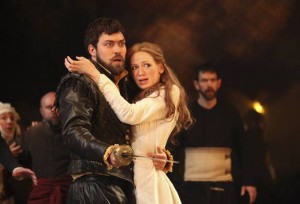Fake Shakes(peare)

Alex Hassell and Lucy Briggs-Owen in the RSC’s Cardenio
Moseley has quite a reputation for sticking the name ‘Shakespeare’ on plays to flog them (when did you last watch Shakespeare’s masterpiece, Iphis and Iantha, or A Marriage Without a Man, a Comedy?), but even he only affixed Shakespeare as an afterthought to the more formally titled ‘Mr Fletcher’. ‘Shakespeare’ – no ‘Mr.’ needed – is already a brand at this stage. And taking Moseley’s publication as evidence for Shakespeare’s authorship is a bit like picking up a copy of Harry Potter and the Leopard Walk-Up-To Dragon and assuming it’s part of the canon of J. K. Rowling.
There’s no suggestion, however, that Double Falsehood was an out and out forgery. Lewis Theobald, who first worked on the text, was devoted to dispassionate criticism of Shakespeare’s textual history. He invented more or less modern textual criticism. His reputation was temporarily trashed by his great rival, Alexander Pope, who considered scholarship dull. (The number of journalists who have recently described Theobald as ‘a writer of pantomimes’ probably has something to do with the prevalence on university syllabuses of Pope’s comic Dunciad, in which Theobald appears as King of Dunces.) But, dull though he may have been, Theobald was no hoaxer.
There have been plenty of Shakespeare forgeries in the past – anyone looking for a laugh should dig up a copy of the Ireland Shakespeare forgeries, which include a series of manuscript poems and letters supposedly written by Shakespeare, along with Shakespeare’s ‘own’ print editions of his own plays. Shakespeare’s signatures were so valuable by the 1790s that William Henry Ireland decided to scrawl ‘William Shakespeare’ all over the margins in grossly varying imitations of an original signature. Does any real writer randomly scribble his signature across his own library?
Ireland also filled out some of the great mysteries of Shakespeare’s life through convenient correspondence: to counter Shakespeare’s silence on religion, a letter appeared professing fierce Protestantism, alongside a love poem sent to his wife, inheritrix of the famous ‘second best bed.’ Ireland even introduced a letter from Elizabeth I confirming a close relationship between the two icons, a mythic element of the Shakespeare brand brilliantly explored by Helen Hackett in a recent book, Shakespeare and Elizabeth. But all of this paled into insignificance compared to the deliciously execrable Vortigen, Ireland’s forgery of a Shakespeare play so unwatchable it makes Double Falsehood feel like Twelfth Night.
So if Double Falsehood has a little bit of Shakespeare, why complain? Does it matter if a play is solely the work of a master artist, or a collaboration? To many of us, the answer is yes. It’s true that most 16th Century play texts we now have are the result of collaboration – if nothing else, between the publisher and playwright, or the actors who sold on their partial scripts, poorly reconstructed. Oxford Professor Tiffany Stern has demonstrated convincingly that prologues and epilogues were routinely shuffled between plays, or rewritten by jobbing hacks. But there’s something different at work when the whole body of play is pulled in different directions by different writers. And there’s something special that happens when we buy a ticket for a play by a single canonical author called William Shakespeare.
Despite centuries of disagreement about what makes Shakespeare objectively ‘good’, it’s worth highlighting a rather unfashionable value, ambiguity. The reason one can sit through a hundred different productions of The Merchant of Venice is that Shakespeare raises tough questions without ever resolving them. Is Shylock an anti-Semitic stereotype or a sympathetic victim? Critics can fight for centuries, but they won’t agree. To maintain this level of complexity, though, each play needs an overarching sense of unity. Shylock’s contradictions need to be convincing, or else the character is an inconsistent mess. ‘Shakespeare’ plays with more than one author often suffer from such problems of consistency.
But something much worse happens when they’re billed as the work of Shakespeare alone. Introducing a new play into a pre-existing canon changes the way we feel about the author as a whole. To use the jargon, it interferes with what Foucault called ‘the author-function’: the relationship the public has with the idea of an author’s body of work. So, if we call Double Falsehood a Shakespeare play, it dilutes the Shakespeare Brand as a whole.
This may seem like it should only matter to the Chamber of Commerce of Stratford on Avon. In fact, it should matter to everyone who thinks that Romeo and Juliet has the power to change lives. Because if a teenager is dragged to Double Falsehood and leaves with a lifelong conviction that ‘Shakespeare’ is pallid and dull, they may never get a chance to engage with the real thing. And that’s a loss to all of us.
Pages: 1 2






